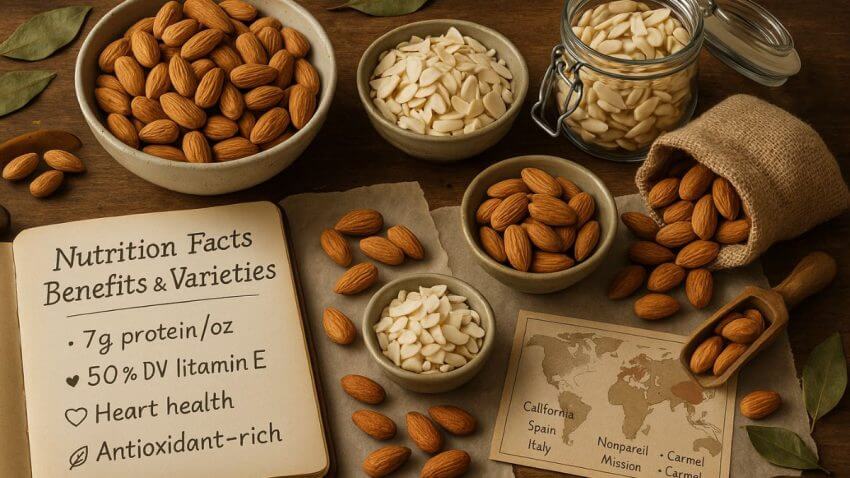Almonds (Prunus dulcis) are nutrient-dense tree nuts rich in vitamin E, magnesium, and healthy monounsaturated fats. Often enjoyed as snacks, in baking, or as almond butter, they support heart health and provide sustained energy. Their crunchy texture and mild, slightly sweet flavor makes them versatile for both culinary and nutritional applications.

| 🌿 Scientific Name: | Prunus dulcis |
| 🌍 Origin: | Middle East, Mediterranean |
| 🏆 Top Producers: | USA, Spain, Iran |
| 🥄 Serving Size: | 28g (~23 pieces) |
| 🎨 Color: | Light brown with darker skin |
| 🌸 Taste: | Mild, slightly sweet, buttery |
| 🌱 Diet Type: | Vegan, Vegetarian |
| 📦 Shelf Life: | 12 months (stored properly) |
🥜 What nutrients are in almonds?
Almonds provide exceptional vitamin E, magnesium, and healthy fats in a compact 28g serving.
| Nutrient | Amount per 28g | % Daily Value |
|---|---|---|
| Calories | 164 | 8% |
| Protein | 6g | 12% |
| Total Fat | 14.2g | 18% |
| Monounsaturated Fat | 8.9g | – |
| Carbohydrates | 6.1g | 2% |
| Dietary Fiber | 3.5g | 13% |
| Vitamin E | 7.3mg | 49% |
| Magnesium | 76mg | 18% |
| Calcium | 76mg | 6% |
| Iron | 1.0mg | 6% |
| Potassium | 208mg | 4% |
❤️ What are the health benefits of almonds?
Research shows almonds support cardiovascular health, blood sugar control, and weight management through their unique nutrient profile.
- Heart Health Support: The 8.9g monounsaturated fats per serving help reduce LDL cholesterol levels. Studies show consuming 1.5oz almonds daily can lower cardiovascular disease risk by 35%.
- Blood Sugar Control: High fiber (3.5g) and protein (6g) content slows glucose absorption. Research indicates almonds can reduce post-meal blood sugar spikes by 30% compared to refined carbohydrates.
- Bone Health: Contains 76mg magnesium and 76mg calcium per serving, supporting bone mineral density. Magnesium aids in converting vitamin D to its active form for calcium absorption.
- Antioxidant Protection: Provides 7.3mg vitamin E (49% DV), protecting cells from oxidative stress. Almond skins contain additional flavonoids that enhance antioxidant capacity by 20%.
- Weight Management: Despite being calorie-dense, almonds’ protein and fiber promote satiety. Studies show people consuming almonds regularly have lower BMI and reduced abdominal fat.
For Complete Information About Almond Nutrition: Complete Nutritional Profile and Health Benefits
🌰 What types of almond varieties exist?
Almonds come in sweet and bitter varieties, with numerous cultivars offering different sizes, shapes, and flavor profiles.
- Sweet Almonds: Nonpareil (most common, blanches easily), Carmel (smaller, harder shell), Butte (self-fertile variety)
- Processing Forms: Raw, roasted, blanched (skin removed), sliced, slivered, almond flour, almond butter
- Grades: Fancy (premium whole), Standard (good quality), Select Sheller Run (mixed sizes)
- Specialty Types: Organic, sprouted, activated (soaked and dried), Marcona (Spanish variety, sweeter and softer)
🛒 How do you choose and store almonds?
Select almonds with uniform color and no rancid smell, then store in cool, dry conditions to maintain freshness.
Selection Criteria:
- Look for plump, uniform-sized nuts without cracks or holes
- Avoid almonds with dark spots, mold, or oily appearance
- Fresh almonds should smell sweet and nutty, not rancid or bitter
- Choose vacuum-packed or airtight containers for longer shelf life
Storage Methods:
- Room Temperature: 4 weeks in airtight container
- Refrigerator: 12 months in sealed container
- Freezer: 24 months in freezer-safe bags
- Bulk Storage: Keep in original packaging until opening
⚖️ How much almonds should you eat daily?
The recommended serving size is 1 ounce (28g or about 23 almonds) daily for adults, with adjustments for children and specific health goals.
- Adults: 28g (1 oz) daily provides optimal benefits without excess calories
- Children 2-8 years: 14g (½ oz) as part of balanced diet
- Teenagers: 21-28g depending on activity level and caloric needs
- Weight Loss: Stick to 14-21g to control calorie intake
- Athletes: Up to 42g (1.5 oz) for higher energy and protein needs
👥 Who should eat almonds and who should avoid them?
Most people benefit from almonds, but those with tree nut allergies must avoid them completely.
Ideal For:
- Heart disease patients (supports cardiovascular health)
- People with type 2 diabetes (helps blood sugar control)
- Athletes and active individuals (sustained energy)
- Vegetarians and vegans (plant-based protein source)
Should Avoid or Limit:
- Tree Nut Allergies: Can cause severe allergic reactions
- Kidney Stones: High oxalate content may worsen condition
- Digestive Issues: High fiber may cause bloating in sensitive individuals
- Weight Gain Concerns: Calorie-dense, requires portion control
🤔 What are interesting facts about almonds?
Almonds have fascinating botanical and historical characteristics that distinguish them from other nuts.
- Not Actually Nuts: Almonds are seeds from the fruit of almond trees, botanically related to peaches and apricots
- Ancient Superfood: Archaeological evidence shows almonds were consumed 19,000 years ago in the Middle East
- Water Intensive: It takes approximately 1 gallon of water to grow 1 almond, making them resource-intensive crops
- Bee Dependent: Almond orchards require 2.8 million bee colonies annually for pollination, representing 70% of US commercial bees
- California Dominance: California produces 80% of the world’s almonds, with over 1 million acres of orchards
Checkout Interesting Facts about Cashew Nut.
💰 How much do almonds cost?
Almond prices typically range from $4-8 per pound depending on variety, processing, and packaging.
- Raw Almonds: $4-6 per pound in bulk
- Organic Almonds: $6-8 per pound
- Specialty Varieties: Marcona almonds $8-12 per pound
- Processed Forms: Almond butter $8-15 per pound, almond flour $6-10 per pound
- Value Comparison: More expensive than peanuts ($2-3/lb) but comparable to other tree nuts like walnuts ($6-8/lb)
❓ FAQ related to Almonds
Is almond a nut or a fruit?
Botanically, almonds are seeds from the fruit of the almond tree (Prunus dulcis), not true nuts. They’re classified as drupes, similar to peaches and apricots, where we eat the seed inside the hard shell rather than the fleshy fruit.
Can you eat raw almonds?
Yes, raw almonds are safe and nutritious to eat. In the US, “raw” almonds are actually pasteurized for safety but retain their nutritional value. Truly raw almonds are available from some specialty suppliers but must be handled carefully.
Are almonds good for weight loss?
Almonds can support weight loss when eaten in moderation (1 oz daily). Their protein and fiber promote satiety, helping control appetite. Studies show people who include almonds in their diet tend to have lower body weight despite the calorie density.
Is almond safe for diabetics?
Yes, almonds are excellent for diabetics. Their low glycemic index, high fiber, and healthy fats help stabilize blood sugar. Research shows almonds can reduce post-meal glucose spikes and improve long-term blood sugar control.
Can Dogs/Cats eat almonds?
Dogs can eat almonds in very small quantities occasionally, but they’re difficult to digest and may cause stomach upset. Cats should avoid almonds entirely as they’re obligate carnivores. Both pets are better served with species-appropriate treats.
Are almonds high in cholesterol?
No, almonds contain zero cholesterol as they’re plant-based. In fact, almonds help lower LDL (bad) cholesterol levels due to their monounsaturated fats, fiber, and plant sterols. Regular consumption can improve overall cholesterol profiles.
Why are almonds so expensive?
Almonds are expensive due to water-intensive cultivation (1 gallon per almond), lengthy growing cycles (trees take 3-4 years to produce), labor-intensive harvesting, and high demand. California’s drought conditions and export markets also drive up prices.
Are almonds anti-inflammatory?
Yes, almonds have anti-inflammatory properties due to vitamin E, monounsaturated fats, and polyphenols in the skin. Studies show regular almond consumption reduces inflammatory markers like C-reactive protein and supports overall inflammatory balance.
Are almonds better than walnuts?
Both are nutritious but offer different benefits. Almonds excel in vitamin E and magnesium content, while walnuts provide more omega-3 fatty acids. Almonds are better for vitamin E needs and bone health, while walnuts are superior for brain health and omega-3 intake. For more details checkout our Almonds vs Walnuts Brain Health blog.
